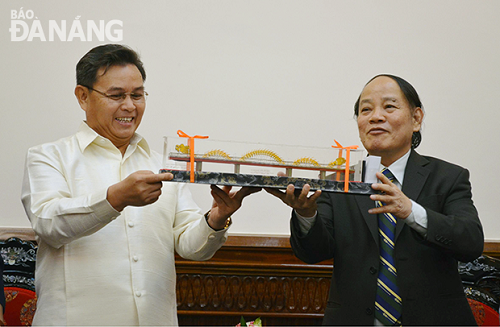Laotian National Assembly members visit the city
On Monday, a group of Laotian National Assembly (NA) members, led by NA Vice Chairman Saysomphone Phomvihane, were warmly received by the Vice Chairman of the Da Nang People’s Council (PC) and Head of the city’s NA members’ group, Mr Huynh Nghia.
Vice Chairman Phomvihane said that this was his second visit to Da Nang, and he sincerely thanked the city’ leaders for their warm welcome. He also said he was very impressed by the city's great progress over recent years. He added that he hoped Da Nang would take advantage of its beautiful beaches, healthy environment, proactive policies and high consensus among local residents in order to deserve the title of Viet Nam’s most liveable city.
 |
| Vice Chairman Nghia presenting a momento to NA Vice Chairman Phomvihane |
The Laotian guest also remarked that the city’s effective infrastructure improvements, especially the upgrade of the Tien Sa Port, has made significant contributions to creating a close link between potential markets along the East-West Economic Corridor.
He also noted that his country is busy making preparations for the 10th Congress of the Lao People’s Revolutionary Party, which will take place next year. In addition, opinions from Laotian citizens nationwide about the amendment of the national constitution will be collected, with a focus on establishing PCs in different administrative units.
On behalf of the city’s leaders, Vice Chairman Nghia highlighted the significance of the visit by the Laotian guests in fostering the special traditional friendship between Laos and Viet Nam. He also highly praised the Laotian government for establishing PCs at all levels.
Also at the reception, the host and his guests expressed their desire that, in the years ahead, the two countries would continue to develop multi-faceted bilateral cooperation programmes in the spirit of friendship, solidarity and mutual development.